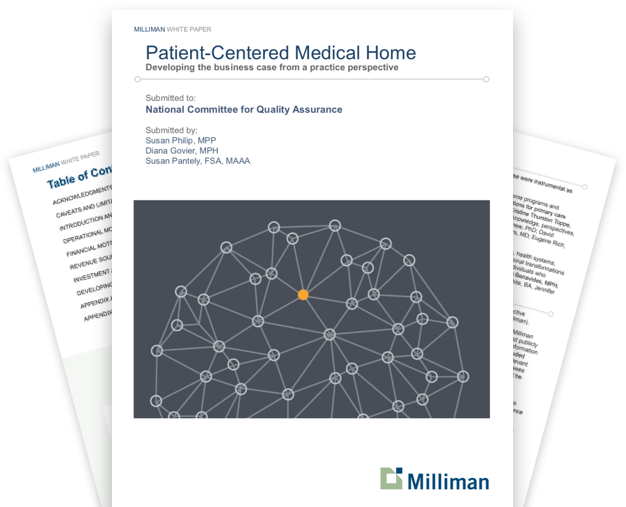Patient-Centered Medical Home (PCMH)
NCQA’s Patient-Centered Medical Home (PCMH) Recognition program is the most widely adopted PCMH evaluation program in the country. More than 10,000 practices (with 50,000+ clinicians) are recognized by NCQA. More than 95 organizations support NCQA Recognition through providing financial incentives, transformation support, care management, learning collaboratives or MOC credit.

About PCMH
The patient-centered medical home is a model of care that puts patients at the forefront of care. PCMHs build better relationships between patients and their clinical care teams.
Research shows that PCMHs improve quality and the patient experience, and increase staff satisfaction—while reducing health care costs. Practices that earn recognition have made a commitment to continuous quality improvement and a patient-centered approach to care.
Policy Amendments
Annual Reporting Fee Structure:
Effective January 1, 2026, late fees will be applied to annual reporting submissions received after the reporting date. This change will help ensure timely and consistent reporting across all programs, and maintain program integrity, accurate Recognition tracking and operational efficiency.
To avoid late fees, please submit all required documentation by the designated reporting deadline.
If you anticipate submission delays, notify your assigned Recognition Programs Representative in advance.
You may also proactively request an extension through My NCQA. Extensions may be requested for up to 90 days beyond your anniversary date.
Annual Reporting Fee Structure for 2026-2027
| Fee Type | Amount per Site | Conditions |
|---|---|---|
| Late Fee | $50 | Applied to submissions received after the reporting date |
| Proactive Extension Fee | $35 | Capped at 5 sites; must be requested in advance; maximum 90-day delay |
Front Matter:
NCQA reserves the right to notify applicable regulatory agencies if aspects of the organization’s operations pose a potential imminent threat to the health and safety of its members and/or NCQA has reason to believe that information submitted to NCQA has been falsified or the organization is required to implement corrective action.
Language Removed:
Before NCQA notifies applicable regulatory agencies, it gives the organization 24 hours to correct the condition or rebut the findings.
New Guidance: Modifications to Scoring for NCQA Recognition Program Evaluations
To help organizations navigate evolving federal and state guidance, NCQA has updated how we score diversity criteria for the following programs:
- PCMH (KM 09 and AR-KM 2).
- PCSP (KM 06 and AR-KM 2).
- Virtual Care Accreditation (EA 2, EA 5, EA 6).
Practices are now required to report on one driver of health outcome disparity (disability, veteran status, socioeconomic status, race, ethnicity, sexual orientation, etc.). Reporting on additional drivers is optional. The selected data point must be collected directly during patient interactions. This change helps practices focus efforts while still identifying subpopulations with unique needs.
These changes are in effect for 2025 reporting and are reflected in the published 2026 Standards and Guidelines. Q-PASS scoring has been updated to reflect these changes for reporting in 2025. If your practice is preparing to submit evidence, please ensure that the relevant documents are attached before submitting. Multiple reports are allowed, but only one is required.
Please submit questions via My NCQA.
-
Save
Save your favorite pages and receive notifications whenever they’re updated.
You will be prompted to log in to your NCQA account.
Save your favorite pages and receive notifications whenever they’re updated.
You will be prompted to log in to your NCQA account.
-
Email
Share this page with a friend or colleague by Email.
We do not share your information with third parties.
Share this page with a friend or colleague by Email.
We do not share your information with third parties.
-
Print
Print this page.
Print this page.
Overview
Why PCMH?
-
Reduce Fragmentation
The PCMH model emphasizes team-based care, communication and coordination, which has been shown to lead to better care.
-
Align With Payers
Many payers acknowledge PCMH Recognition as a hallmark of high-quality care. As a result, many payers provide incentives for NCQA-Recognized practices.
-
Improve Staff Satisfaction
The PCMH model is associated with better staff satisfaction. One analysis found implementation of NCQA PCMH Recognition to increase staff work satisfaction while reported staff burnout decreased by more than 20%.1
-
Improve Patient Experience
A Hartford Foundation study found that the PCMH model resulted in a better experience for patients, with 83% of patients saying being treated in a PCMH improved health.1
-
Better Manage Chronic Conditions
The PCMH model has been shown to help better manage patients’ chronic conditions.
-
Align With State/Federal Initiatives
As more emphasis is placed on value-based care, many state and Federal programs are embracing the patient-centered model of care.
-
Lower Health Care Costs
PCMH Recognition is associated with lower overall health care costs.
-
Improve Patient-Centered Access
PCMHs emphasize the use of health information technology and after-hours access to improve overall access to care when and where patients need it.
Get Started with PCMH Recognition
Get Started with PCMH Recognition
Latest PCMH Blog Articles
Latest PCMH Videos
PCMH Distinction Programs
Distinction in Behavioral Health Integration
NCQA’s Distinction in Behavioral Health Integration recognizes primary care practices that put resources, protocols, tools and quality measures in place to support the broad needs of patients with behavioral health related conditions.
We’re ready to help
Contact us today
-
Current Customer? Ask a Question
Using My NCQA
-
Interested in PCMH? Contact Us Today!
We're Here To Help.



